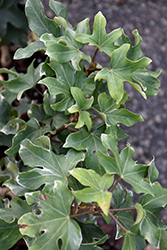It's all about ...
plants

Curly Fatshedera
Fatshedera x lizei 'Curly'
Height: 3 feet
Spread: 3 feet
Sunlight:
![]()
![]()
Hardiness Zone: 8a
Other Names: Curly Leafed Ivy, Tree Ivy, Aralia Ivy
Description:
This variety is considered a shrubby vine, presenting elegantly curled and twisted leaves that are shiny green with narrow white margins; a great way to add texture to a border or trellis; non clinging, and does not climb without assistance
Ornamental Features
Curly Fatshedera has attractive dark green foliage edged in white with hints of grayish green which emerges chartreuse in spring on a plant with an upright spreading habit of growth. The twisted lobed leaves are highly ornamental and remain dark green throughout the winter. The burgundy stems can be quite attractive.
Landscape Attributes
Curly Fatshedera is a multi-stemmed evergreen shrub with an upright spreading habit of growth. Its average texture blends into the landscape, but can be balanced by one or two finer or coarser trees or shrubs for an effective composition.
This shrub will require occasional maintenance and upkeep, and can be pruned at anytime. It has no significant negative characteristics.
Curly Fatshedera is recommended for the following landscape applications;
- Mass Planting
- Border Edging
- General Garden Use
- Container Planting
Planting & Growing
Curly Fatshedera will grow to be about 3 feet tall at maturity, with a spread of 3 feet. It has a low canopy. It grows at a medium rate, and under ideal conditions can be expected to live for 40 years or more.
This shrub does best in partial shade to shade. It does best in average to evenly moist conditions, but will not tolerate standing water. It is not particular as to soil type or pH. It is highly tolerant of urban pollution and will even thrive in inner city environments. This particular variety is an interspecific hybrid.
Curly Fatshedera makes a fine choice for the outdoor landscape, but it is also well-suited for use in outdoor pots and containers. With its upright habit of growth, it is best suited for use as a 'thriller' in the 'spiller-thriller-filler' container combination; plant it near the center of the pot, surrounded by smaller plants and those that spill over the edges. It is even sizeable enough that it can be grown alone in a suitable container. Note that when grown in a container, it may not perform exactly as indicated on the tag - this is to be expected. Also note that when growing plants in outdoor containers and baskets, they may require more frequent waterings than they would in the yard or garden. Be aware that in our climate, most plants cannot be expected to survive the winter if left in containers outdoors, and this plant is no exception. Contact our experts for more information on how to protect it over the winter months.
This plant is not reliably hardy in our region, and certain restrictions may apply; contact the store for more information.
